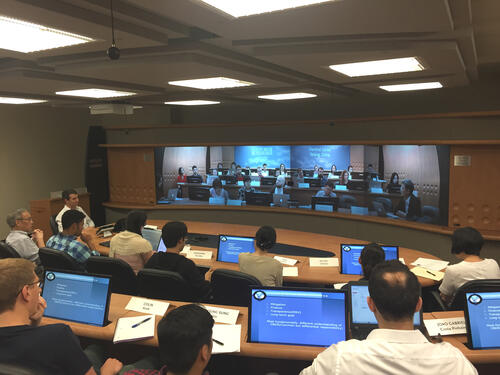Joint course on US-China relations at Stanford and Peking University
Joint course on US-China relations at Stanford and Peking University

EASTASN 285: The United States, China, & Global Security
Simultaneously taught at Stanford and Peking University
Spring Quarter, Academic Year 2015-16
Held in the Highly Immersive Classrooms at Stanford’s Graduate School of Business and the Stanford Center at Peking University
Lead instructors
Karl W. Eikenberry – Stanford University
Shiming Fan – Peking University
Course syllabus
Course description
Organized under the auspices of the U.S-Asia Security Initiative at the Walter H. Shorenstein Asia-Pacific Research Center in the Freeman Spogli Institute for International Studies, this graduate-level seminar is being listed by Stanford’s Center for East Asian Studies and Peking University’s School of International Studies. The course is taught simultaneously on the campuses of Stanford and Peking University and features a lecture series in which prominent American and Chinese scholars provide presentations that focus on key global security issues.
The course content highlights topics relevant to current U.S.-China relations and their respective roles in Asian and global security. Lecture topics include: an introduction to U.S.-China relations finance, trade, and investment; cyber security; nonproliferation; maritime security; terrorism; and energy and the environment.
Hosted jointly but administered separately by Stanford and Peking University, this is a 2-Unit course offered on a Credit/No Credit (C/NC) basis at Stanford and on the Score System at Peking University. Participation is restricted to graduate students. Enrollment is limited to 20 students at each campus.
Class format
The class meets once a week and includes a series of eight lectures on important issues in international security. Topics are presented in English from both American and Chinese perspectives. Each week, a 30-minute lecture is given by each of the Stanford and Peking University scholars featured that day. The course format consists of two 30-minute lectures followed by a 20-30 minute session for student questions and topic discussion.
The Highly Immersive Classrooms at both Stanford and Peking University provides the technological link between the two teaching sites that facilitates interactions between the participating faculty and students at both campuses.
Acknowledgements
This course was created by Karl Eikenberry, the Oksenberg-Rohlen Distinguished Fellow in the Shorenstein Asia-Pacific Research Center at the Freeman Spogli Institute for International Studies and director of the U.S.-Asia Security Initiative. Eikenberry is also Stanford's lead instructor for the course. The Center for East Asia Studies (CEAS) at Stanford officially listed the course with the Registrar with the approval and support of Gordon Chang, director of CEAS; John Groschwitz, associate director of CEAS; and Kristin Kutella Boyd, student services coordinator at CEAS. Jean Oi, the Lee Shau Kee Director of the Stanford Center at Peking University (SCPKU), and Jiashu Cheng, executive director of SCPKU, hosted the Peking University faculty and students during their participation in the course. Qingguo Jia, dean of the School of International Studies, and Shiming Fan, deputy dean of the School of International Studies facilitated the approval of the course with the Peking University administration and also facilitated the participation of PKU faculty and students in the course. Fan is also the lead instructor for the course on the Peking University campus.
Video
This video features commentary from the two lead instructors - Karl Eikenberry, director of Stanford's U.S.-Asia Security Initiative and former U.S. ambassador to Afghanistan, and Fan Shiming, professor and assistant dean of PKU's School of International Studies.
